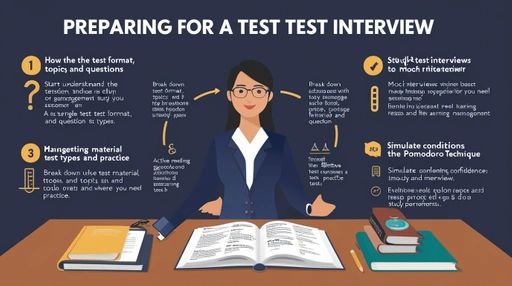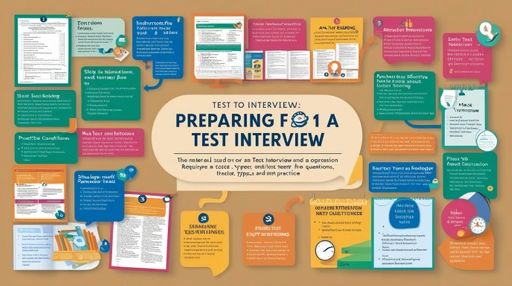How to study for a test interview, Preparing for a test interview requires a structured approach that combines organization, focus, and practice. Start by understanding the test format, topics, and question types to create a targeted study plan. Break down the material into manageable sections and prioritize areas where you need improvement. Utilize effective study techniques such as active reading, note-taking, and practice tests to reinforce learning and improve retention.
Simulate test conditions through mock interviews to enhance confidence and time management. Additionally, adopt strategies like the Pomodoro Technique to maintain focus while studying. Finally, ensure proper rest, a balanced diet, and regular breaks to keep your mind sharp. Consistent preparation, self-assessment, and a positive mindset are essential for success in a test interview. Preparing for a test interview requires a strategic approach that combines effective study techniques, time management, and self-assessment. This comprehensive guide outlines essential steps to help you excel in your test interview.
1. Understand the Test Format and Content
Begin by thoroughly understanding the test’s structure and the topics it will cover. Review any guidelines or materials provided by the interviewer to identify key areas of focus. This clarity will enable you to tailor your study plan effectively.
2. Develop a Study Plan
Create a structured study schedule that allocates time to each topic based on its importance and your proficiency. Prioritize areas where you feel less confident, but ensure a balanced approach to cover all necessary content. Utilize the traffic lights system to categorize topics:
- Green: Important and simple topics to study first.
- Amber: Important but time-consuming topics to study next.
- Red: Complex and less vital topics to study last.
This method helps in managing time efficiently and focusing on areas that yield the greatest benefit.
3. Utilize Effective Study Techniques
Employ study methods that enhance comprehension and retention:
- Active Reading: Engage with the material by summarizing information in your own words and asking questions to deepen understanding.
- Note-Taking: Use methods like the Cornell System to organize notes systematically, making review sessions more productive.
- Practice Testing: Regularly test yourself on the material to reinforce learning and identify areas needing improvement.
4. Incorporate Time Management Strategies
Effective time management is crucial for productive study sessions:
- Pomodoro Technique: Study for 25-minute intervals followed by a 5-minute break to maintain focus and prevent burnout.
- Prioritization: Tackle challenging subjects during peak productivity times to maximize efficiency.
5. Engage in Mock Interviews
Simulate the interview environment through mock interviews to build confidence and improve performance. This practice helps in refining answers, improving communication skills, and reducing anxiety.

6. Practice Under Test Conditions
Recreate the test environment by practicing with time constraints and without external aids. This approach familiarizes you with the test’s pressure, improving time management and performance during the actual interview.
7. Review and Reflect
After each study session, review the material covered and assess your understanding. Reflect on any mistakes made during practice tests to avoid repeating them. Continuous self-assessment leads to steady improvement.
8. Maintain a Healthy Lifestyle
A healthy body supports a sharp mind:
- Adequate Sleep: Ensure you get sufficient rest to enhance memory consolidation and cognitive function.
- Balanced Diet: Consume nutritious meals to maintain energy levels and concentration.
- Regular Exercise: Engage in physical activity to reduce stress and improve mental well-being.
9. Stay Positive and Confident
Maintain a positive mindset throughout your preparation. Confidence can significantly impact performance, so focus on your progress and stay motivated.
By following these steps, you can prepare effectively for your test interview, enhancing your chances of success. Remember, consistent effort and a strategic approach are key to excelling in any evaluative scenario.
Conclusion
Studying for a test interview requires careful planning, effective strategies, and consistent effort. By understanding the test format, creating a structured study plan, and practicing with mock tests, candidates can build confidence and improve performance. Utilizing techniques like active reading, note-taking, and time management ensures better retention and preparation. Additionally, maintaining a healthy lifestyle and staying positive further enhances focus and reduces stress. Ultimately, success in a test interview depends on thorough preparation, self-assessment, and a determined mindset, enabling candidates to approach the interview with confidence and competence.

7 thoughts on “How to study for a test interview”
Comments are closed.